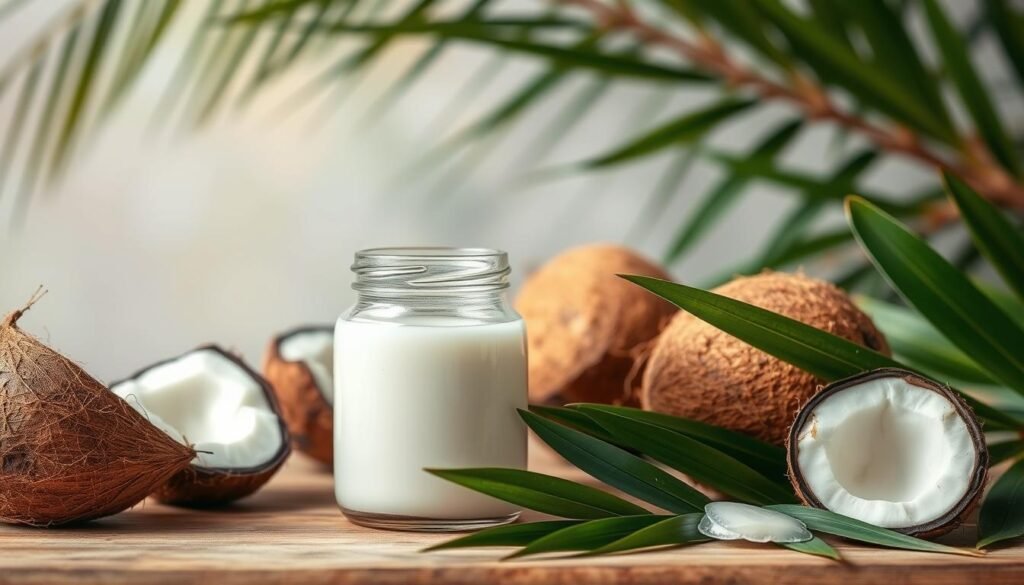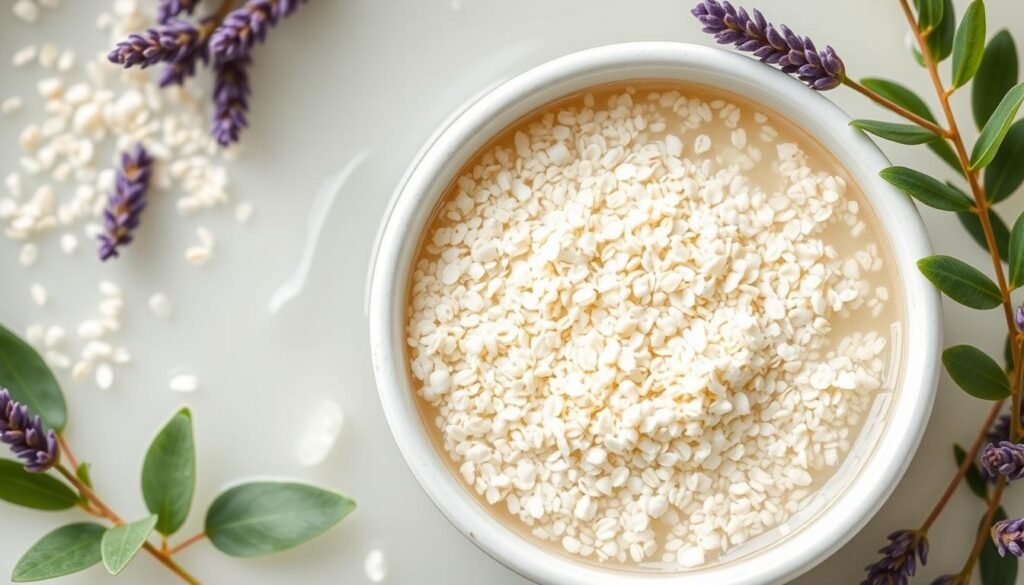Did you know over half of people with eczema try alternative medicine or home remedies? Eczema, also called atopic dermatitis, causes dry, itchy, red skin. It affects many people around the world. Thankfully, natural remedies and lifestyle changes can really help. This article will share seven natural ways to ease eczema. You’ll learn how to use nature’s gifts for relief. Plus, knowing what triggers eczema is a big step towards feeling better.
Key Takeaways
- Over half of eczema patients resort to alternative treatments for relief.
- Coconut oil serves as a popular moisturizer with antibacterial benefits.
- Aloe vera gel is known for its healing properties and antimicrobial effects.
- Dietary changes can play a role in managing eczema symptoms.
- Understanding triggers, including stress and climate factors, is essential for effective eczema management.
- Natural remedies often provide a safer alternative to conventional treatments.
Understanding Eczema and Its Symptoms
Eczema is a common skin problem, affecting over 31 million in the U.S. alone. It’s mostly seen in kids but can occur at any age. Atopic dermatitis is the type we see most often.
What is Eczema?
Eczema covers several skin issues that cause inflammation. It leads to dry, itchy patches, sometimes red, swollen, or flaky. Genetics play a big role, with some gene issues making skin dryer and itchier.
Common Symptoms of Eczema
- Itchy skin (pruritus), which can range from mild to intense
- Dry and flaky patches
- Redness and inflammation
- Oozing or crusting in severe cases
Black Americans often face harsher eczema symptoms. This highlights the need for understanding and managing this condition well.
Different Types of Eczema
There are many kinds of eczema, all with different triggers. Let’s look at the main ones:
| Type of Eczema | Description |
|---|---|
| Atopic Dermatitis | The most common type, affecting millions of children and adults |
| Contact Dermatitis | Occurs when skin comes into contact with irritants or allergens |
| Dyshidrotic Eczema | Usually affects the hands and feet, causing blisters |
| Neurodermatitis | Characterized by thick, scaly patches often linked to chronic itching |
| Seborrheic Dermatitis | Commonly affects oily areas of the body, like the scalp and face |
Knowing the types of eczema helps us find the best ways to treat and prevent it.
What Causes Eczema Flare-Ups?
Knowing what sets off eczema is key to handling it well. Eczema can flare from environmental and personal factors. Figuring out what triggers your eczema is the first step to better manage it.
Identifying Eczema Triggers
What triggers eczema differs for everyone. Some common causes are:
- Food allergies such as dairy, eggs, and nuts
- Household irritants like harsh soaps, detergents, and chemicals
- Environmental factors including pollen, dust mites, and pet dander
- Clothing materials that cause irritation, particularly wool and synthetic fabrics
- Extreme temperatures such as cold, damp, or excessively hot conditions
When you know these triggers, you can steer clear of them. This is vital for keeping eczema under control.
How Allergies and Irritants Affect Eczema
Allergies and irritants are a big deal for eczema. An overreactive immune system can trigger inflammation due to allergens. Research points to a certain gene mutation that might make skin dry and itchy. This can make you more vulnerable to eczema.
Certain jobs, like hairstyling or being a mechanic, can expose you to things that cause eczema. Stressful living situations may also make eczema worse. Stress affects how your immune system works.
Understanding these aspects can guide you in handling your eczema. Knowing and dealing with your triggers can make flare-ups less common and severe. This is key to better skin health.
How to Get Rid of Eczema: 7 Natural Treatment Tips
Natural treatments for eczema provide alternative relief options. They include various eczema natural remedies to soothe and heal skin. These options help people choose wisely for their eczema skincare routines.
Overview of Natural Remedies
Many natural remedies have been effective for eczema. Some top options include:
- Coconut oil: This oil helps restore the skin barrier with its antibacterial fatty acids.
- Aloe vera: Known for soothing, it reduces itching and inflammation.
- Colloidal oatmeal: Great for irritation, it’s used in baths or as paste.
- Chamomile: Reduces redness and swelling with its anti-inflammatory properties.
- Calendula: Promotes cell regeneration and reduces inflammation.
- Probiotic-rich foods: These foods improve skin health with beneficial bacteria.
- Dietary changes: Foods rich in omega-3 fatty acids and antioxidants aid skin recovery.
Why Choose Natural over Conventional Treatments?
Some people choose natural eczema treatments to avoid side effects from usual medications. Natural remedies align with a holistic health approach. By using natural treatments, they promote healthier skin without the risks of negative reactions.
Natural Remedy #1: Coconut Oil
Coconut oil is a popular choice for those with eczema. It deeply moisturizes the skin. With its high fatty acid content, it repairs and hydrates the skin coconut oil eczema treatment.
Benefits of Coconut Oil for Eczema
Studies show coconut oil can ease flaking and dryness in eczema. It’s antibacterial, reducing infection risks. Regular use boosts skin hydration and comfort, showing coconut oil benefits.
How to Use Coconut Oil Effectively
Apply coconut oil daily to the affected skin for best results. Use it after bathing to lock in moisture. Always do a patch test first to avoid allergic reactions.
Interested in DIY care? Mix 60g coconut oil, 15g beeswax, and 30g Manuka honey. This homemade cream is a great way to manage eczema symptoms.

Natural Remedy #2: Aloe Vera Gel
Aloe vera gel is a famous natural cure for skin issues, like eczema. It’s known for amazing skin healing features. Aloe vera eases irritated skin and keeps it moist. With its 75 nutrients, it strengthens skin and fights dryness. This makes it great for eczema sufferers.
Properties of Aloe Vera for Skin Healing
Aloe vera’s benefits for eczema are well-known. It has anti-inflammatory and germ-fighting traits. These calm inflamed skin and lower infection chances. Research shows aloe vera speeds skin repair by up to 30%. It also keeps skin moist and healthy.
Application Tips for Aloe Vera
For the best use of aloe vera gel, here are some tips:
- Apply pure aloe vera gel to the affected areas two to three times daily for optimal results.
- Using it after bathing can help lock in moisture and enhance the benefits of the gel.
- Select products where aloe vera is listed at or near the top of the ingredients list for better effectiveness.
- Patch test fresh gel on a small skin area first to avoid potential allergic reactions.
Natural Remedy #3: Colloidal Oatmeal
Colloidal oatmeal is a strong natural remedy for eczema. It’s made from finely ground oatmeal that soothes and protects the skin. Its anti-inflammatory and antioxidant properties reduce irritation and itchiness.
How Colloidal Oatmeal Works for Eczema
Colloidal oatmeal is backed by research and approved by Health Canada and the US FDA. It significantly improves skin health by reducing dryness, scaling, and itchiness. Avenanthramides in oats help achieve these effects.
Best Ways to Incorporate Colloidal Oatmeal into Your Routine
Adding colloidal oatmeal to your daily skin care is easy and boosts oatmeal bath benefits. To use, you can:
- Add powdered colloidal oatmeal to warm bathwater for a soothing soak.
- Apply lotions with colloidal oatmeal directly to dry areas for better hydration.
- Mix colloidal oatmeal with water to make a paste. Apply it to irritated skin for quick relief.
Using colloidal oatmeal regularly helps control symptoms and improves skin texture over time. To learn more, read detailed research on using colloidal oatmeal for skin care.

| Study Focus | Findings |
|---|---|
| Clinical Studies on Colloidal Oatmeal | More than 30 studies with over 3000 patients prove its effectiveness. |
| Moisture Retention | It binds water to the skin, improving moisture retention and protection. |
| Skin Improvement | Regular use leads to less itchiness, dryness, and better skin comfort. |
Natural Remedy #4: Honey
Honey, especially Manuka honey, has amazing healing properties. It helps a lot with eczema. It fights bacteria and reduces swelling, making it great for skin care. Its healing properties also keep the skin moist. This helps prevent eczema flare-ups.
The Healing Properties of Honey for Eczema
Using honey helps ease eczema symptoms, research shows. It keeps the skin hydrated and less inflamed, which is essential for eczema sufferers. Honey’s thickness provides a shield on the skin. This prevents infections and keeps moisture in. Also, Manuka honey can fight against over 80 types of pathogens. This makes it especially good for skin issues.
How to Apply Honey for Maximum Benefits
For the best results, use high-grade medicinal honey. This ensures it’s pure and free from contaminants. You can include honey in your skincare in many ways:
- Apply honey directly on irritated skin in a thin layer.
- Mix honey with other soothing agents for better effects.
- Use honey as a treatment mask, leaving it on the skin longer to deeply penetrate.
Check how your skin reacts after using honey. Adjust how often and how you use it as needed. A holistic health practitioner can give personalized advice. They can help include honey in a full eczema care plan. Using effective techniques with honey can give the best relief from this tough condition.
| Property | Benefit |
|---|---|
| Antibacterial | Prevents infection and soothes irritated skin. |
| Anti-inflammatory | Reduces redness and swelling from eczema flare-ups. |
| Moisturizing | Keeps skin moist and reduces dryness. |
| High viscosity | Creates a protective barrier for the skin. |
Natural Remedy #5: Dietary Changes
Dietary changes can really help with eczema symptoms. Knowing which foods set off eczema is key to control it. Choosing what to eat carefully can make your skin better.
Foods That May Trigger Eczema
Some foods often cause eczema to get worse. People may find their skin flares up with these:
- Dairy products
- Gluten-containing grains
- Processed sugars
- Eggs
- Shellfish
Staying away from these foods trigger eczema can help a lot. It can make the condition easier to handle.
Anti-Inflammatory Foods to Include
On the other hand, adding anti-inflammatory foods can control eczema. It’s good to eat these kinds of food:
- Fatty fish like salmon and mackerel
- Leafy greens such as spinach and kale
- Fresh fruits, especially berries
- Nuts and seeds, full of Omega-3s
- Whole grains, like brown rice and quinoa
By making these dietary changes eczema, and focusing on healthy foods, your skin can get better. Talking to a nutritionist can get you advice that fits you and your eczema.

Natural Remedy #6: Gentle Bathing Practices
Bathing is key in managing eczema by keeping the skin moist. The right way to bathe can greatly improve moisture for eczema. This helps prevent dryness and discomfort.
Importance of Moisture for Eczema Management
For people with eczema, it’s important to keep the skin moist. Cold, dry weather can make eczema worse. A humidifier in winter can help keep the air moist. Drinking plenty of water also keeps the skin hydrated from within. Gentle bathing practices help with hydration and eczema care.
Best Practices for Bathing and Aftercare
Right bathing habits can greatly help eczema. Here are key tips:
- Use lukewarm water since hot water can remove natural oils.
- Keep baths to 10-15 minutes to prevent over-drying.
- Choose mild, unscented soaps to avoid irritation.
- Put on a thick moisturizer right after bathing to hold moisture.
- Go for gentle cleaning, stay away from rough exfoliants.
- Wear cotton underthings to reduce clothing irritation.
Having a routine focused on moisture is vital for eczema care. Using these bathing tips can boost skin health and comfort.
| Tip | Description |
|---|---|
| Water Temperature | Use lukewarm water to maintain skin oils. |
| Bath Duration | Keep baths short to avoid dehydration. |
| Soap Type | Choose gentle, fragrance-free products. |
| Moisturizer Application | Apply immediately after bathing. |
| Cleansing Method | Use soft cloths, avoid scrubs or rough textures. |
| Clothing Choice | Wear breathable fabrics like cotton underneath. |
Conclusion
Managing eczema can be tough, as it affects nearly 10% of the U.S. population. Yet, natural remedies offer hope. Using coconut oil and aloe vera helps keep the skin moist. Also, avoiding certain foods can reduce inflammation. Gentle bathing is key, too.
It’s important to know what triggers your eczema and to make a skincare plan. For both kids and adults, avoiding irritants and allergens helps a lot. Genetics do play a part in eczema. But, how we live and what we do can make a big difference in managing it.
Exploring natural remedies is empowering for those dealing with eczema. New treatments, like biologics, show promise when combined with other methods. A whole-body approach to care is the best way. It supports not just the skin, but overall health and happiness.